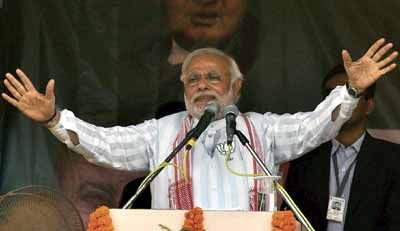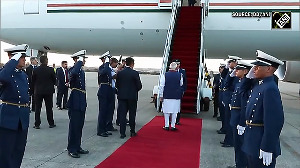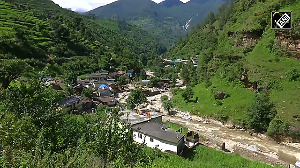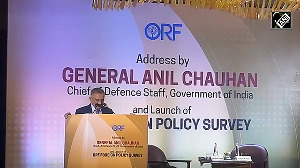
Everyone, it seems, has a question to ask the BJP's prime ministerial candidate these days.
Rediff.com's Sheela Bhatt asked some well-known Indians what they would like to ask Narendra Modi, to gauge what emotions he evokes in them.
Since 2002, Modi-haters, Modi-lovers, Modi-neutrals and Modi-cronies have all been judging Narendra Modi, demonising him, adoring him, trying to demystify him endlessly.
No other leader has been subjected to such scrutiny in recent times.
Every Indian has her/his own idea of how s/he wants a national leader to be. In election season, constantly and intensely, if not the entire nation, then millions of voters silently and invisibly try and figure out the real self of the leaders in the fray, and who they intend to vote for.
The voters do try and fix, in their unique way, the real value of leaders who are quite opaque. Rahul Gandhi and Narendra Modi are before us, but they present themselves in the manner they want to be seen by us. Thus, what is seen is not what is real. That is why interviews with J Jayalalithaa, Mamata Banerjee or Narendra Modi always make for such an interesting show.
Currently, Madhu Kishwar's never-seen-before kind of conversation with Modi on television is engaging for the same reason.
In any interview, we hope and wait eagerly for THAT right question that can bowl the leader, that question which is potent enough to tear down her or his mask. The questions that are posed to a political leader say as much about the interviewer as much about the leader who responds to it.
Modi is provocative, engaging, exciting and polarising. Rediff.com asked some well-known Indians to pose one or two questions to Modi to judge what kind of reactions he evokes in them.
It speaks volumes about Modi's public persona that most of them thought of asking him questions relating to retaining India's pluralistic culture.
We also invite Rediff.com readers to send us their one question to ask Modi, in the dialogue box at the end of this article.
Mahesh Bhatt is a sharp critic of Modi. During the 2002 riots the filmmaker traveled to Ahmedabad and saw first hand how the administrative machinery had collapsed completely.
When Bhatt called on then Ahmedabad police commissioner P C Pande, to Bhatt's shock, Pande asked him to leave the city on the ground that a civil war-kind of situation prevailed there.
Bhatt told Rediff.com: "That is my first impression of Modi."
He narrates an interesting incident from 2003. He says he had spoken against Modi at an event in Surat organised by the Jamaat-e-Ulema-e-Hind. When Modi heard about it, he phoned Bhatt.
The filmmaker recalls Modi told him over the telephone, 'I am ready to solve the problems. Please come and see me. You may bring 50 people or 500 or 5,000. I will meet them all.'
Bhatt has never met Modi, but had this one telephone conversation with the Gujarat chief minister. "Modi spoke with candour," Bhatt remembers.
.jpg?w=670&h=900) When Rediff.com asked Bhatt if he detected a change in the Modi of 2004 and 2014, Bhatt, a harsh critic of Modi, replied, "The world is not static. Human beings change. We evolve. Modi is not an exception. If he aspires to be PM, obviously he realises that the country will not accept a leader who only takes care of the majority community."
When Rediff.com asked Bhatt if he detected a change in the Modi of 2004 and 2014, Bhatt, a harsh critic of Modi, replied, "The world is not static. Human beings change. We evolve. Modi is not an exception. If he aspires to be PM, obviously he realises that the country will not accept a leader who only takes care of the majority community."
"I can't ascertain if his current status is a political compulsion or a change of heart," Bhatt added.
The two questions Mahesh Bhatt wants to ask Narendra Modi, given a chance:
1. Can you substantiate how your vision for the country is in sync with Gandhi's vision for India? And, if it is so, why do Muslims feel so uncomfortable with the very idea that you may become the prime minister?
2. The Sachar Committee that looked into the socio-economic condition of Muslims in the country found out that they were even worse off than the Scheduled Castes and Scheduled Tribes. Now, hypothetically speaking, if you become the prime minister and five years down the line constitute a committee on the lines of the Sachar Committee, how different do you think the situation of Muslims will be? What do you plan to do for them to ensure that it's not as bad as the Sachar Committee discovered?
Shahid Siddiqui is the editor-owner of the Nai Duniya newspaper. He has moved from one political party to another and knows a lot more about leaders than what he shares with his readers.
He has met Modi and was granted an exclusive interview. Currently, he criticises the Congress's treatment of minorities over the decades and does not find Modi a political untouchable.
"Before I met Modi," Siddiqui told Rediff.com, "my impression was that he is an unreasonable, irritation-prone, short-tempered, sulking type. I had the impression that he doesn't entertain criticism. When I met him, I found him to be a man with guts (dumdaar). He is not a loose cannon. He did not convince me fully, but I found him to be a serious man."
"I think Modi is psychologically and emotionally a stable man," the editor felt.
Siddiqui would like to ask many questions of Modi, but the two questions he won't miss out on are:
1. If you are elected prime minister, what immediate steps will you take to reassure the minorities that they will be safe and have equal opportunities as other Indian citizens?
2. Do you have a plan to resolve the Kashmir issue once and for all, and what will be your policy to deal with terrorism emanating from Pakistan?
Meenal Baghel is the young and successful founder-editor of Mumbai Mirror, the city's largest selling tabloid. Baghel, author of the non-fiction best-seller Death in Mumbai, is enormously interested in anything that makes news.
She told Rediff.com, "I don't know Modi or Rahul Gandhi enough. These leaders are so opaque. Modi's public speeches are tightly controlled. He is not giving enough interviews."
This is what she would like to ask Modi:
1. What would be your first priority if you become the PM? If it is the economy, then what are the first corrective steps you'll take?
2. The minorities are apprehensive about you coming to power. How would you reassure them?
Kuldip Nayar, the distinguished journalist who has always been on the side of civil liberties, has observed every general election since 1952.
Nayar, who has bravely and tirelessly struggled for a better relationship, peace and tranquillity between India and Pakistan, told Rediff.com, "Modi will not be good for India. I don't want him to become the PM. What message will go out to the world?"
This extraordinary commentator has just one question for Narendra Modi:
1. Why are you polarising a pluralistic society?
Inder Malhotra, one of India's most respected political commentators, has seen Indian history unfold after 1947 from a vantage position. He is not particularly enamoured of Modi, but says, "Modi has absolutely knocked out the Congress. His campaign trail is skilful. The Congress can't match Modi."
Inder Malhotra's two questions for Modi are:
1. What are your plans for the Ram Janambhoomi and other Hindutva issues?
2. What do you think of the state of the BJP leadership today, and what kind of reform do you want in it? Also, could the BJP become a one-man show, as it is in Gujarat?
Please post your one question for Narendra Modi in the dialogue box below, giving your name and e-mail address, and we will publish the questions on Rediff.com
Image: Narendra Modi at an election meeting in Sibsagar, Assam, on Monday, March 31. Photograph: PTI Photos.
On Friday, Sheela said: Is the Congress's diagnosis and cure all wrong?
On Thursday, Sheela said: He served tea, I am a mason, says the man facing Modi at home
On Wedneday, Sheela said: When the Gandhi family played too safe
Last Tuesday, Sheela said: Priyanka is chief of staff in Rahul's office
Last Monday, Sheela said: Why Modi had to get rid of Harin Pathak











